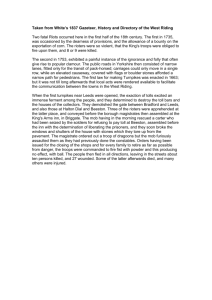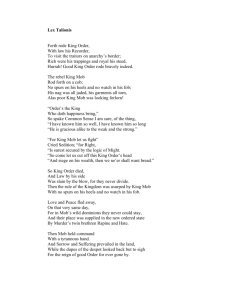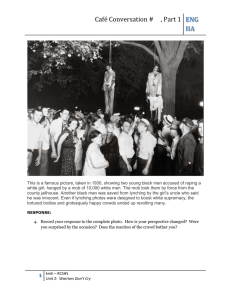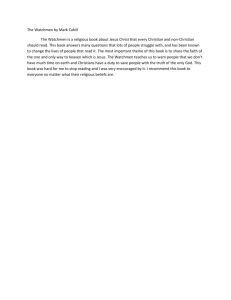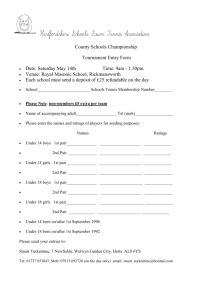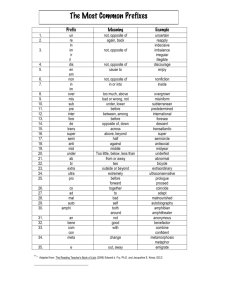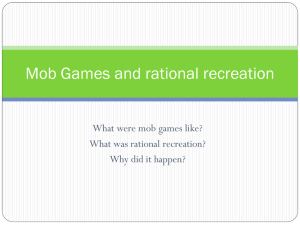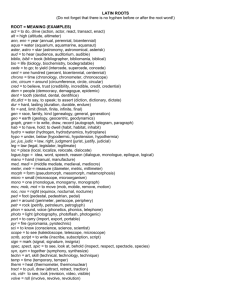1834. The New York City “Abolitionist” Riot
advertisement
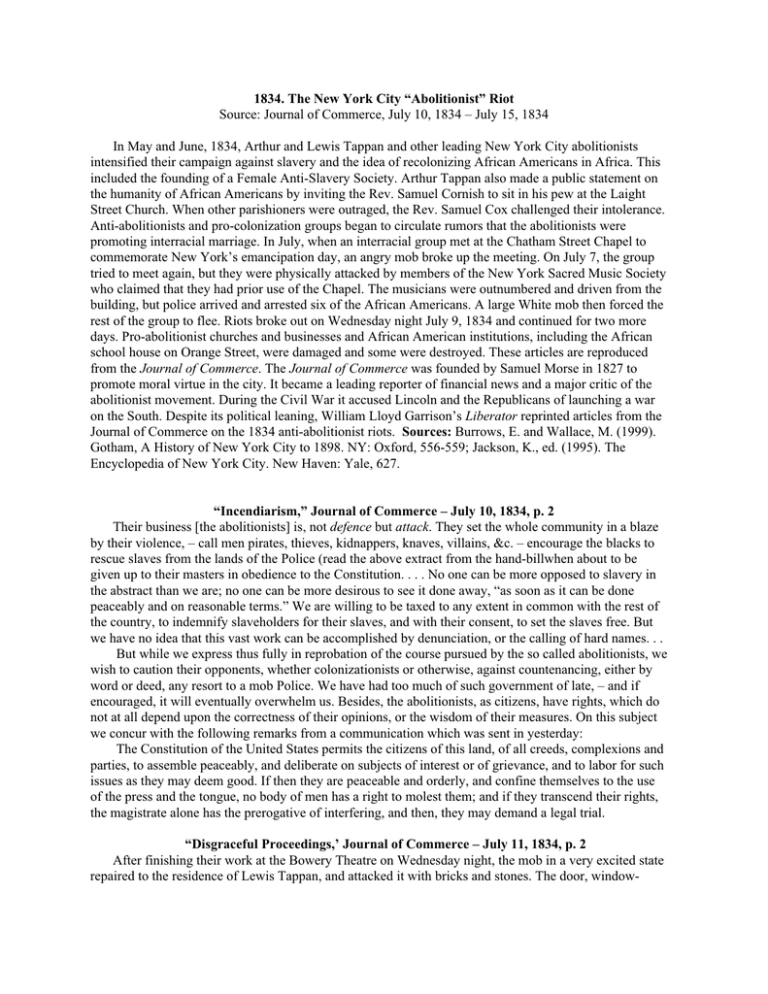
1834. The New York City “Abolitionist” Riot Source: Journal of Commerce, July 10, 1834 – July 15, 1834 In May and June, 1834, Arthur and Lewis Tappan and other leading New York City abolitionists intensified their campaign against slavery and the idea of recolonizing African Americans in Africa. This included the founding of a Female Anti-Slavery Society. Arthur Tappan also made a public statement on the humanity of African Americans by inviting the Rev. Samuel Cornish to sit in his pew at the Laight Street Church. When other parishioners were outraged, the Rev. Samuel Cox challenged their intolerance. Anti-abolitionists and pro-colonization groups began to circulate rumors that the abolitionists were promoting interracial marriage. In July, when an interracial group met at the Chatham Street Chapel to commemorate New York’s emancipation day, an angry mob broke up the meeting. On July 7, the group tried to meet again, but they were physically attacked by members of the New York Sacred Music Society who claimed that they had prior use of the Chapel. The musicians were outnumbered and driven from the building, but police arrived and arrested six of the African Americans. A large White mob then forced the rest of the group to flee. Riots broke out on Wednesday night July 9, 1834 and continued for two more days. Pro-abolitionist churches and businesses and African American institutions, including the African school house on Orange Street, were damaged and some were destroyed. These articles are reproduced from the Journal of Commerce. The Journal of Commerce was founded by Samuel Morse in 1827 to promote moral virtue in the city. It became a leading reporter of financial news and a major critic of the abolitionist movement. During the Civil War it accused Lincoln and the Republicans of launching a war on the South. Despite its political leaning, William Lloyd Garrison’s Liberator reprinted articles from the Journal of Commerce on the 1834 anti-abolitionist riots. Sources: Burrows, E. and Wallace, M. (1999). Gotham, A History of New York City to 1898. NY: Oxford, 556-559; Jackson, K., ed. (1995). The Encyclopedia of New York City. New Haven: Yale, 627. “Incendiarism,” Journal of Commerce – July 10, 1834, p. 2 Their business [the abolitionists] is, not defence but attack. They set the whole community in a blaze by their violence, – call men pirates, thieves, kidnappers, knaves, villains, &c. – encourage the blacks to rescue slaves from the lands of the Police (read the above extract from the hand-billwhen about to be given up to their masters in obedience to the Constitution. . . . No one can be more opposed to slavery in the abstract than we are; no one can be more desirous to see it done away, “as soon as it can be done peaceably and on reasonable terms.” We are willing to be taxed to any extent in common with the rest of the country, to indemnify slaveholders for their slaves, and with their consent, to set the slaves free. But we have no idea that this vast work can be accomplished by denunciation, or the calling of hard names. . . But while we express thus fully in reprobation of the course pursued by the so called abolitionists, we wish to caution their opponents, whether colonizationists or otherwise, against countenancing, either by word or deed, any resort to a mob Police. We have had too much of such government of late, – and if encouraged, it will eventually overwhelm us. Besides, the abolitionists, as citizens, have rights, which do not at all depend upon the correctness of their opinions, or the wisdom of their measures. On this subject we concur with the following remarks from a communication which was sent in yesterday: The Constitution of the United States permits the citizens of this land, of all creeds, complexions and parties, to assemble peaceably, and deliberate on subjects of interest or of grievance, and to labor for such issues as they may deem good. If then they are peaceable and orderly, and confine themselves to the use of the press and the tongue, no body of men has a right to molest them; and if they transcend their rights, the magistrate alone has the prerogative of interfering, and then, they may demand a legal trial. “Disgraceful Proceedings,’ Journal of Commerce – July 11, 1834, p. 2 After finishing their work at the Bowery Theatre on Wednesday night, the mob in a very excited state repaired to the residence of Lewis Tappan, and attacked it with bricks and stones. The door, window- blinds, shutters, &c., were soon demolished, after which the mob entered, broke up the furniture, and made a bon-fire of it in the street. The Watchmen were on the spot directly and made a vigorous charge upon the mob, and in spite of volleys of stones and brick bats, drove them pell mell down Rose street into Pearl. There the space became so large that the watchmen were unable to keep up the pursuit, and the mob had time to rally and charge back. The watchmen in turn were driven off the ground. This alternate advance and retreat were repeated two or three times. It was then determined by the Mayor and civil authorities that the watchmen should arm themselves with missiles, so as to have a fair chance with the rioters. Armed thus, and aided by a strong reinforcement, another and successful charge was made. The crowd was dispersed, and the civil authorities kept possession of the ground. All this occupied an hour and a half or more. Several of the rioters were arrested, and are in custody. A number of persons were bruised and wounded in various ways, but no one, we believe, dangerously. The mob was composed chiefly of boys and young men, collectively of no party on this or any other subject. We hear nothing from our citizens but one universal expression of disapprobation and regret. However wrong the course of abolitionists may have been, another wrong will not make the matter right. Mr. Tappan and his family were absent, as we understand, though the rioters had reason to believe there were women and children in the house when they attacked it. The value of the furniture destroyed was probably three or four hundred dollars. Much the largest proportion of the furniture was untouched, and most of the rooms were not entered. During the night some apprehension was felt for Dr. Cox, in consequence of threats thrown out; as also for the store of Arthur Tappan & Co. But neither was molested. Several colored men in going home from their places of employment down town, fell into the hands of the rioters, and were shamefully beaten. One in particular, a most inoffensive and estimable man, employed in a wholesale ware house, suffered severely. In general, however, such persons were not molested. They certainly ought not to be, – for, as a general thing, the blacks have had nothing to do with getting up the present excitement, and we know that many of them would be much better pleased if their officious friends would make less disturbance on their account. The scene, take it all in all, was more disgraceful than any thing we have ever witnessed in our city. We were pained yesterday to see a highly respectable French house who occupy the chambers over the store of Arthur Tappan & Co., removing their goods, through apprehension of their safety. What! In this community of merchants and of laws, are a merchant’s goods to be rendered unsafe by his opinions or practices, except through process of law? What will they say of us abroad? What will become of us at home? The whole matter is a dishonor to us, which, if we could prevent it, should never be known beyond the limits of the city. The rioters, as it appeared upon the examination of some of the ringleaders yesterday at the Police, are among the lowest of our population. We trust they will be punished as the safety of our homes and our families demands. “More Disgraceful Proceedings,” Journal of Commerce – July 11, 1834, p. 2 Early in the evening, say about sunset, before the regular hour for setting the watch, a mob collected in the Bowery, and proceeded to Chatham street Chapel. They succeeded in opening the outer gate, and were about breaking into the Chapel, when a strong body of watchmen and Police presented themselves and dispersed them. The cry then was, “To Dr. Cox’s!” and away they ran, 150 to 200 in number, and proceeded to Dr. Cox’s church, corner of Laight and Varick streets. They then commenced pouring vollies of stones and brick bats into the windows, which are mostly shattered to pieces. From the Church they went to Dr. Cox’s house, in Charlton Street, two or three doors from Prince, and broke in the windows and door. But they had not entered the house, when a body of Watchmen and a small detachment of Cavalry arrived, cleared the ground, and formed a line across the street at the extremities of the block – the watchmen in front, and the horsemen in the rear. The rioters then went round to King street, where they worked hard for an hour in trying to find a back passage to the house, or at least to ascertain what house stood in its rear. But they labored in vain; the occupants of the houses could not direct them. About the same time they formed a barricade of carts, &c. across the streets, in order to hem the horsemen and watchmen in. Upon this, the watchmen made a charge, and blows and brick bats were passed pretty freely back and forth. One watchman who rushed incautiously into the crowd, in advance of his companions, had his club taken from him, and was severely beaten. The watchmen eventually succeeded in clearing away all obstructions, and the mob, finding they were overmatched, and that nothing more could be done at that point, retired in small detachments, one after another, and when we left, at half past twelve o’clock, but a small company remained, most of whom were peaceable citizens, who had assembled as mere spectators. Dr. Cox had fortunately left town, with his family, in the course of the day, having been apprised that an attack upon his premises would probably be made. About midnight, a parcel of boys, returning from Dr. Cox’s house, and taking Church Street in their way, threw several vollies of stones through the windows of Zion church (a colored Methodist society) and broke a great number of panes. Evening Papers Report, Journal of Commerce – July 11, 1834, pg. 2 We are glad to see, in all the evening papers, a decided expression of disapprobation of the outrageous conduct of the mob in attacking Mr. Tappan’s house and destroying his furniture. It appears to us there can be but one opinion on the subject, among reflecting men. If a man’s domicil, which even the laws dare not invade except under peculiar circumstances, is to be made the sport of an unprincipled mob at their pleasure, who of us is safe? No one. Under different circumstances the same storm would have burst upon us, or upon thee, reader. If you are not shielded by the laws, what is your protection? Even despotism, with its standing armies, is better than perpetual anarchy. Many a people have endured the former, but none ever long endured anarchy. The enemies of liberty have represented free institutions as incompetent to protect the citizen in trying circumstances: and they will rejoice at the unprecedented frequency of riots in this city, as going to illustrate the truth of their doctrines. In every point of view, these disorders are deeply to be lamented. They must be put down. Like every other vicious habit, they gain strength by indulgence. They must therefore be put down now. The strong arm of the law must be exerted to the full extent which the peace and order of the city demand. Every good citizen will say Amen. Evening Post. If the riots which have disgraced our city for the few days past are to be often repeated, we shall soon cease to have any claim to the character of a decent and orderly community. Star. One thing is certain, means must be taken to suppress these riots and punish the perpetrators of them, or we are no longer a country of laws. A man may be mobbed for his political or religious opinions; his house and property may be burned and destroyed; and he has no redress. Something must be done, or we shall be all anarchy and confusion. Commercial Advertiser. Although none disapprove more decidedly than we have done, the course of Mr. Tappan and his professors, in relation to the subject of abolition, yet we condemn most unqualifiedly the attack made last night upon his premises. We profess to live under a government of laws, and the sanctity of private habitation and repose are not to be violated.We hope the authors of the injuries to his dwelling will be detected, and brought to condign punishment. No provocation can be sufficient, where the laws are peaceably and impartially administered, to justify a resort to personal outrage. American. We say let the Police – let Law be supported with all energy. Nor, till it has asserted its dignity, let the friends of order pause to examine the amount of provocation the rioters have received, or the measure of punishment that has been already, with such flagrant illegality, awarded. “Peace of the City,” Journal of Commerce – July 12, 1834, p. 2 The public mind was extremely feverish yesterday, more so than on any previous day. The riots formed the universal topic of conversation everywhere; and many were apprehensive that we had not seen the worst of them. In the course of the forenoon, Dr. Cox had occasion to visit his house in Charlton street, which he did, accompanied by a friend, and on leaving it, they were followed up Prince street by about fifty boys, and a few men, hooting, shouting, &c. They had walked up (not run, as report had it,) to the vicinity of Broadway, when the retinue became rather troublesome, and the Dr’s. friend thought it expedient to call at the residence of one of the Dr’s. parishoner’s who received them very cordially. Before entering, however, the Dr. stood for some time on the lower step, and conversed with his extra attendants. After remaining about an hour at this hospitable retreat, a carriage was procured, and the friend who accompanied the Dr. to and from Charlton street, conveyed him to his own (the friend’s) home. In the course of the day the Dr. left the city. About one o’clock a gentleman called at the Police office and stated that he wanted to take some things out of Dr. Cox’s house, but that it was surrounded by a large concourse of people, and he feared that should he open the door to get out the things, the people would rush into the house and destroy it. The magistrates sent four officers up to the house with him, who found between two and three hundred persons assembled about it, who had evidently been attracted there by mere curiosity to see what injury it received during the preceding night, and the greater part of them quietly dispersed on being spoken to by the officers. Proclamation of Mayor Cornelius W. Lawrence, Journal of Commerce – July 12, 1834, p. 2 The Mayor feels himself compelled by a sense of public duty, to notice the riotous conduct of large numbers of citizens, during the nights of the 9th and 10th inst. However repugnant to the good sense of this community, are the doctrines and measures of a few misguided individuals, on the subject which has led to the existing excitement of the public mind, their conduct affords no justification for popular commotion. The laws are sufficient to restrain whatever is subversive of public morals, and to punish all violations of public decorum. On them alone must the citizen rely; and misjudging and imprudent men, as well as the most temperate and discreet, must be protected in their undoubted rights of person and property. It is unnecessary to do more than allude to the interruptions of the peace during the two last nights; but there being reason to apprehend that further disorders are contemplated, the Mayor, with the concurrence of the Magistrates of the city, issues this Proclamation, enjoining all good citizens to refrain from mingling with any crowd which may assemble in the streets during the evening; and to use their influence, each within his own proper sphere of action, to prevent such congregations. Parents, Guardians, and Employers are called upon to co-operate in the purpose of this recommendation, by guarding with unusual vigilance those under their control, during the continuance of the present excitement. The Watch, and all Public Officers are hereby required to be active and prudent in the discharge of their duties. The Mayor assures the community that the Magistrates have adopted efficient measures to maintain the rights of the Citizens, and to preserve the Public Peace: and to this end, they are resolved to exercise with energy, the powers with which they have been entrusted. Attack on Tappan’s Store, Journal of Commerce – July 12, 1834, p. 2 Mr. Tappan’s store was attacked at half-past nine last evening, by a number of boys and men, who fired volleys of stones and broke the upper windows, but did not attempt to force the doors. The mob were suspicious that there were things behind the doors, to which they did not wish to be introduced. As it was, they put themselves out of the pale of law, and may thank a better spirit than their own that they were not treated as they deserved. On the first appearance of the watch they scattered, and after standing about in squads for some times dispersed, and before 11 o’clock had all withdrawn to other scenes of action. The missiles, only in one instance, were sufficiently powerful to break the window shutters. Between ten and eleven a large mob assembled at Doctor Cox’s church in Laight Street and smashed in the doors and windows and demolished the interior of the building. From the church they proceeded to Charlton street where he resides, but a strong detachment of watchmen were placed in line across the East end of the street and prevented all ingress to it. After remaining some time about Charlton street the mob proceeded to Spring street and attacked Rev. Mr. Ludlow’s church, the doors and windows of which they began to batter in, when a small party of watchmen arrived and put a momentary stop to their proceedings, and took one or two of the ringleaders into custody. Their companions however soon liberated them, beat the watchmen off, and maltreated some of them. – They then recommenced the work of destruction, broke in the doors, shattered the windows to atoms, and entered the Church. In a short time they broke up the interior of it, destroying whatever they could. . . . Whilst this mob was spending its fury upon the churches in Laight street and Spring street another mob assembled at the African church opposite the Opera House. They however, retired after dashing a few stones into the windows. Between 11 and 12 o’clock, a detachment of the mob proceeded from the Spring Street Church to Rev. Mr. Ludlow’s dwelling house, in Thompson Street, between Prince and Houston, broke in the windows and doors, but were prevented from going in by the arrival of a squadron of cavalry. Mr. Ludlow and his family are out of town. About 11 o’clock, another mob attacked St. Philips African Episcopal church in Centre Street, – Rev. Peter Williams, a colored man, pastor, – and demolished it almost entirely, including a fine organ. The furniture they took out and burned it in the street. The windows of the African Baptist church in Anthony st. were broken to atoms. The African school-house in Orange street, which is also used as a Methodist meeting-house, was totally demolished. Several house where colored people resided, in Orange and Mulberry Streets, between Anthony and Walker, and about the Five Points, were greatly injured or totally destroyed. The mob compelled the occupants of the houses to set lights at the windows, and wherever colored people were seen, or no lights were shown, the work of destruction commenced. In one case a colored woman advanced to the window with her light, when in an instant some missile was sent which knocked her down and extinguished the light. . . . About 9 o’clock a detachment of the mob at the Five Points commenced an assault upon a small wooden building in Orange, near Bayard street, occupied as a barber’s shop, by a colored man, named Marsh, the front and interior of which they soon demolished. The black intrepidly kept possession of his premises, discharging a pistol three times at his assailants, the last of which unfortunately took effect, and severely wounded Elisha Spence in the leg, as he was passing on the opposite side of the street on his way home. The rioters then joined the main body in Leonard st. A strong body of the watch shortly afterwards arrived at the spot, and succeeded, with little difficulty, in putting the rioters to flight, and dispersing a much more numerous body of spectators. “Sentiments of the Daily Press,” Journal of Commerce – July 12, 1834, p. 2 Evening Post. If the riots which have disgraced our city for the few days past are to be often repeated, we shall soon cease to have any claim to the character of a decent and orderly community. Star. One thing is certain, means must be taken to suppress these riots and punish the perpetrators of them, or we are no longer a country of laws. A man may be mobbed for his political or religious opinions; his house and property may be burned and destroyed; and he has no redress. Something must be done, or we shall be all anarchy and confusion. Commercial Advertiser. Although none disapprove more decidedly than we have done, the course of Mr. Tappan and his professors, in relation to the subject of abolition, yet we condemn most unqualifiedly the attack made last night upon his premises. We profess to live under a government of laws, and the sancity of private habitation and repose are not to be violated. We hope the authors of the injuries to his dwelling will be detected, and brought to condign punishment. No provocation can be sufficient, where the laws are peaceably and impartially administered, to justify a resort to personal outrage. American. We say let the Police – let Law be supported with all energy. Nor, till it has asserted its dignity, let the friends of order pause to examine the amount of provocation the rioters have received, or the measure of punishment that has been already, with such flagrant illegality, awarded. Gazette. If such a course be permitted, no man is safe in the legal pursuit of his avocation or in the peaceable expression of his sentiments, both of which are secured to him by the Constitution of our Republic. Mercantile Advertiser. It was with great pain we witnessed some of the riotous proceedings of Wednesday evening, and would sincerely hope we may never again have to record scenes so inconsonant with the intelligence of the age, and so much at war with every principle of self government – which, when it ceases to become a government of reason loses its most essential conservative power. In vain have the sacrifices of blood and treasure been expended, to secure our republican form of government, if our citizens suffer themselves to be led into disorganization and tumult which must ensure, when they take law into their own hands, and would punish those, who through misguided, or intemperate zeal, undertake to fly in the face of reason and public opinion. “Causes of the Late Riots,” Journal of Commerce,– July 15, 1834, p. 1 Order and tranquility being again restored to the city, it may be proper to inquire briefly into the causes of the late disturbances. We instance – 1. The indiscreet zeal of the abolitionists. On this point we need not enlarge. The evidences of the fact are before the eyes of the whole community. 2. The course pursued by some of the newspapers. While it cannot be expected that newspapers should withhold their comments from matters so thrust upon their notice as the proceedings of the abolitionists have been, it can and ought to be expected, that they will abstain from appeals to mob violence. Such appeals, we regret to say, have been made, in a manner perfectly intelligible to those upon whom they were intended to operate. Take for example the following, from the Courier and Enquirer of Tuesday, 8th inst. at the same time bearing in mind that it was but the sequel of a series of most inflammatory paragraphs, which had appeared in successive numbers of that paper, calculated to arouse the indignation of the rabble against the abolitionists: “The riot at Chatham street Chapel last evening, was it not commenced and carried on by the negroes themselves. The white citizens present were there with no disposition to disturb the blacks. It was the Sacred Music Society that interfered, as they were perfectly justified in doing; and when they mildly insisted on their clear rights, they were beaten – yes, beaten, fellow citizens, by the bludgeons of an infuriated and an encouraged negro mob! How much longer are we to submit? In the name of the country, in the name of Heaven, how much more are we to hear from Arthur Tappan’s mad impudence?” On the following day, Wednesday, the same paper contained a furious paragraph against the abolitionists, which concluded as follows: “Learning that there is to be another meeting at Chatham street chapel to-night, we caution the colored people of this city against attending it. No one who saw the temper which prevailed last night, can doubt that if the blacks continue to allow themselves to be made the tools of a few blind zealots, the consequences to them will be most serious.” The following is from the Courier and Enquirer of Friday: “In the present instance, no one who has had an opportunity to witness the impression made on the popular mind by the doctrines openly promulgated by the immediate abolitionists and amalgamators, can wonder that such an ebullition of feeling was the consequence, as that which has evinced itself. When they openly and publicly promulgate doctrines which outrage public feeling, they have no right to demand protection from the people they thus insult.” On Monday, 14th inst., after stating that some 10 or a dozen men, and 20 or 30 boys, committed all this mischief,” the Courier says, –“On the whole, we trust the immediate abolitionists and amalgamators will see in the proceedings of the last few days, sufficient proof that the people of New York, have determined to prevent the propagation amongst them of their wicked and absurd doctrines, much less to permit the practice of them. If we have been instrumental in producing this desirable state of public feeling, we take pride in it. Let our political opponents make the most of the avowal”. . . . 3. It was noticed as a fact full of instruction, that last Sunday night, when many of the churches and lecture rooms were closed for fear of the mob, Tammany Hall was brilliantly lighted up for the meeting of infidels, who carried on their mummery without the slightest apprehension of danger. . . . At the sacking of Mr. Tappan’s house, a fellow was heard to say that every rascal of a church member ought to be thrown off the dock; or to that effect. We think therefore we see inscribed on the banner of this guilty throng, Enmity to the Cross of Christ. 4. The fourth cause we shall mention, is the impunity of the rioters at the late election. The success of the mob then, and the cheap-bought fun they had at the expense of the watchmen and police, has emboldened the present gang to try the same experiment. We hope the magistrates will see the necessity of inflicting severe punishment upon all who are convicted. 5. The actors behind the scene. We suspect it will prove that these riots were premeditated, – not perhaps in all their details, but in the gross, – and that a number of men claiming to hold a respectable rank in society, were privy to them several days before they occurred, if not the chief instigators of them. 6. A cause which greatly contributed to swell the ranks of the rioters, was the desire of plunder. From the character of several of the persons arrested, and other circumstances, we conclude that the whole thieving population of the city were eventually concerned in these riots. We infer it also from the fact, that in the destruction near the Five Points, plunder went hand in hand with the work of demolition or invasion. 7. Efforts were made to connect other causes and interests with this movement, such as the “State prison monopoly,” and some others; but, so far as appears, without success. Finally, we remark, that when reason again takes the helm, instead of passion, prejudice, or phrenzy, the outrages of the past week will be denounced by every friend of the constitution, every lover of order and law, every tolerant man, every human man, and above all, by every Christian. What! has it come to this, that in free America, men cannot express their opinions, because the whole community almost, holds to opposite opinions? Or admitting that no sentiments may be uttered but such as the majority approve, are an infuriated mob to act as censors of the pulpit and the press? Are they to do it, not by tearing down arguments, but by demolishing churches and dwellings, – by turning the city into a scene of anarchy and confusion, – in short, by acting like devils incarnate in the shape of men? God forbid. Sooner will we fight the battles of the Revolution over again, or dive into the recesses of the wilderness, where we can think, speak and act, according to the dictates of our own judgments, right or wrong, provided we violate no law.
